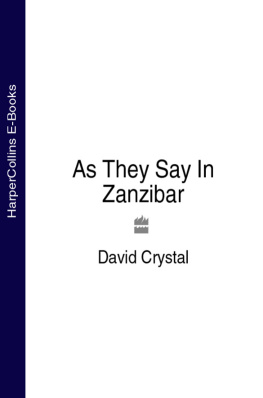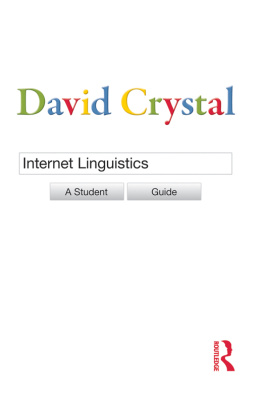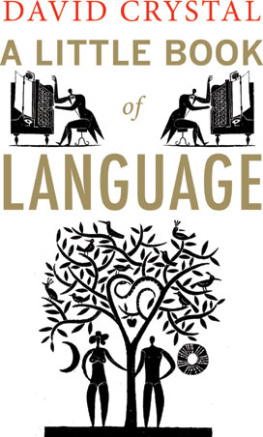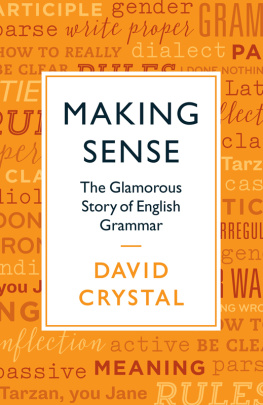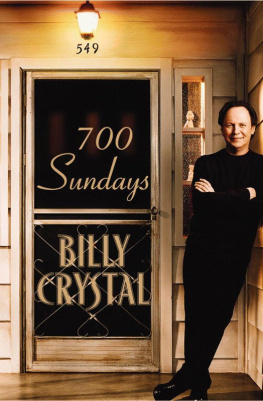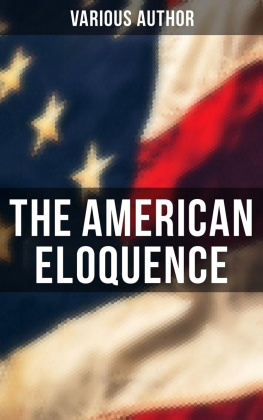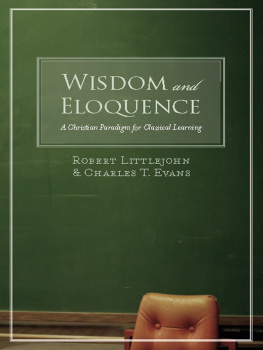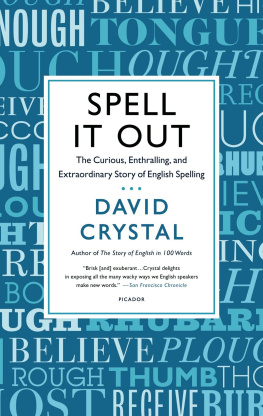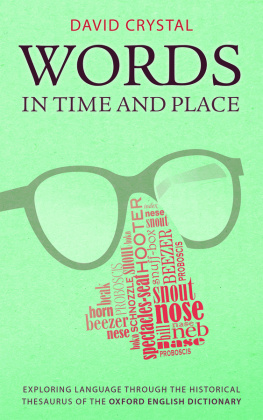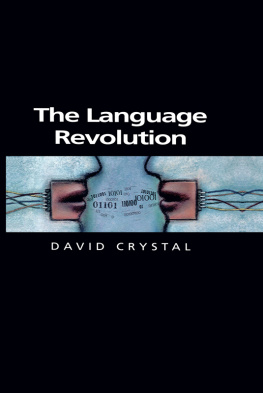

Copyright 2016 David Crystal
All rights reserved. This book may not be reproduced in whole or in part, in any form (beyond that copying permitted by Sections 107 and 108 of the U.S. Copyright Law and except by reviewers for the public press) without written permission from the publishers.
For information about this and other Yale University Press publications, please contact: U.S. Office:
Europe Office:
Typeset in Adobe Caslon Pro by IDSUK (DataConnection) Ltd Printed in Great Britain by TJ International Ltd, Padstow, Cornwall
Library of Congress Cataloging-in-Publication Data
Names: Crystal, David, 1941- author.
Title: The gift of the gab : how eloquence works / David Crystal.
Description: Oxford, U.K, : Yale University Press, [2016]
LCCN 2015048302 | ISBN 9780300214260 (hardback)
LCSH: Elocutionists | Eloquence in literature. | Oral communication. | Voice culture. | Storytelling. | BISAC: LANGUAGE ARTS & DISCIPLINES / Rhetoric. | LANGUAGE ARTS & DISCIPLINES / Public Speaking.
Classification: LCC PN4051.2 . C79 2016 | DDC 808.5dc23
LC record available at http://lccn.loc.gov/2015048302
A catalogue record for this book is available from the British Library.
10 9 8 7 6 5 4 3 2 1
Contents
ELOQUENCE, n.: The art of orally persuading fools that white is the colour it appears to be. It includes the gift of making any colour appear white.
(Ambrose Bierce, 1911, The Devils Dictionary)
Prologue
As long as I can remember, I have had a love affair with eloquence. Perhaps it stems from my mixed Welsh and Irish background, as from my childhood days I recall listening in wonder to my relatives telling stories in dramatic lilting tones, having long and voluble arguments gabbing away, as they would say about every topic under the sun, and wondering how it was possible to string so many words together so effectively. Or perhaps it was in school, trying this gab out for myself, in front of the class, and being praised for it. And punished too, for being eloquent when I should have been silent. Eloquence, I soon learned, was a double-edged sword.
Was it a gift, this ability to gab? If so, it seemed to be a gift that everyone possessed. When I moved to Liverpool, at the age of ten, I was highly impressed by the humorous, vivid expression of fast-talking, down-to-earth Scousers, who could use sentences as if they were rapier thrusts, and I soon added its character to my Celtic mix. Eloquence got me out of trouble, as I now know it did Peter Ustinov and Billy Connolly, who both found humorous repartee an effective way of evading unwelcome attention from school bullies the survival of the linguistically fittest.
In secondary school, I was enthralled by an English teacher who showed us how we could stretch our voices to achieve some remarkable effects, and in school plays came to realize that this wasnt just theory, but it could make audiences do some strange things, such as laugh and cry. I did both on my first ever visit to Stratford-upon-Avon, where I learned thanks chiefly to the powerful, resonant tones of Paul Robeson as Othello what amazing heights the human voice is capable of achieving.
And so to university, where eventually, as a new lecturer, I had my first real chance to bring together all those experiences into a speaking style of my own, to convey my delight in discovering my second great love affair with the subject of linguistics. Then a third, when opportunities arose to do some broadcasting. Then a fourth, when invitations started to come in to talk to clubs, societies, and conferences about this new and up-and-coming subject. It dawned on me that life looked as if it was going to be a succession of public-speaking engagements and so it proved to be.
Being a linguist, I wanted to work out what I was doing that was right, and what had happened if a speech went wrong when people became restive, started looking at their watches, didnt laugh at a joke, or gave me polite applause. At one extreme there might be rapt attention, and I could have heard the proverbial pin drop; at the other there might be the mutual muttering of those who found their neighbours utterances more engaging than mine. Public speakers have to anticipate all eventualities, and learn to cope with them, whether it is heckling from the back of the hall, drunken interventions at a wedding reception, or the resonant chime announcing the powering up of a laptop. Sometimes it isnt their fault that things have not gone according to plan. Sometimes it is. Its essential to recognize the difference, and that means learning as much as possible about the way we speak.
I had been trained as a phonetician at University College London, and my first job there, as part of the great Survey of English Usage, was to explore how the speaking voice was used in everyday settings. My doctoral research had been on English intonation a central feature of eloquence and that had involved analysing how great public speakers achieved their successes. Ill be talking about some of them in this book. And it was while I was doing that research that I came to realize that not everyone could speak equally well. It was something I had vaguely noticed at school and as an undergraduate that some teachers were not very good at getting their ideas across but the more I spread my listening net, the more I saw that some people were just not very good at public speaking at all. Asking around, I found many who admitted to being scared of it. I lost count of the number of people who, after a talk, came up to me and said I could never do what you do.
This puzzled me. I had to rethink my belief that everyone could like Uncle Joe in Wales or Richie and his mates in Liverpool talk the hind leg off a donkey, given the chance to do so. There were many, it seems, who couldnt even begin to get the donkeys attention, and who didnt even want to try. I felt this was a great shame, as theres nothing quite like the thrill of successful eloquence, of knowing that youve said what you wanted to say in the most effective way and caused an audience whether a group of friends, a family gathering, a class of students, or a group of conference delegates to be delighted, enthused, persuaded, and moved by the way youve said it. So Ive written this book to convey something of that thrill, partly to persuade those who think eloquence is not for them that it isnt as far away as they think, and partly to explain to those whove already made some progress in eloquence exactly what it is they have managed to achieve.
Value-added speech
What does eloquence mean to you? If you hear someone described as speaking eloquently, what comes to mind? Here are some scenarios:
Janes father gave a very eloquent speech at her wedding.
Ask Rachel to talk to your club shes a really eloquent speaker.
The prime minister made an eloquent defence of his policy in the House today.
Smith is one of the most eloquent lecturers Ive ever heard.
The archbishop is an eloquent preacher.
My butcher was very eloquent about the quality of his lamb.
You were extremely eloquent, John, when you banged your thumb with a hammer this morning.
There seem to be certain features in common. When speech is described as eloquent, I think of it as being:
fluent it flows easily and at a good pace, without hesitations, linguistic errors, repetitions, or uncertainty in the use of vocabulary, grammar, and pronunciation;
personal it expresses, or appears to express, the convictions of the speaker, whose personality comes across in the choice of language;
Next page

